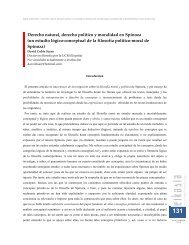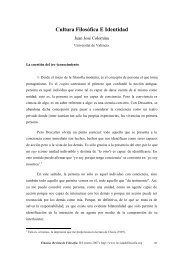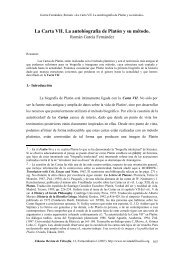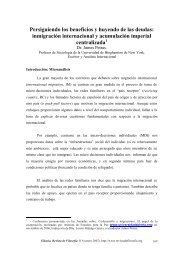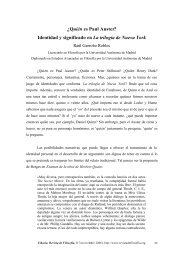Sobre determinismo y libre albedrío. Eikasia 16
Sobre determinismo y libre albedrío. Eikasia 16
Sobre determinismo y libre albedrío. Eikasia 16
Create successful ePaper yourself
Turn your PDF publications into a flip-book with our unique Google optimized e-Paper software.
Socialismo Utópico, la crítica de C. Marx y F. Engels. Su<br />
vigencia en el siglo XXI<br />
María Isabel Ackerley<br />
Investigadora del Consejo Nacional de Investigaciones Científicas y Técnicas (CONICET),<br />
Argentina.<br />
Resumen:<br />
En principio recordamos el período en que Tomás Moro llegó a desempeñar las altas funciones<br />
de Canciller del Reino en tiempos de Enrique VIII, cuando Inglaterra afrontaba los conflictos<br />
creados por el paso de la economía agraria a la industrial. Su libro Utopía, escrito en 15<strong>16</strong> es<br />
una obra fundada en la crítica de una sociedad afectada por males y problemas que,<br />
diversamente, se proyectan hasta nuestros días. Se analiza cómo en el siglo XIX Robert Owen<br />
de Gales, inspirado por el pensamiento de Moro, intenta la formación de cooperativas, siendo<br />
considerado el padre del cooperativismo. Luego recordamos los filósofos franceses que<br />
movidos por lo que ellos creían la necesidad de un cambio social conforman el socialismo<br />
utópico. A partir de aquí se desprenderá la crítica de Marx y Engels a estos modelos de<br />
organización social, que fuera de los experimentos de "Villas de Cooperación", "Harmonías" y<br />
"New Lanark" realizados en Inglaterra y los Estados Unidos no ha llegado nunca a tomar<br />
cuerpo en el terreno político, en forma de partido orgánico.<br />
Utopian socialism, criticism of C. Marx and F. Engels.<br />
His validity in the XXI century.<br />
We start recalling the period in which Thomas More came to play high functions as Chancellor<br />
of the Kingdom at the time of Henry VIII, when England faced the conflicts created by the shift<br />
from an agrarian to an industrial economy. His book Utopia, written in 15<strong>16</strong> is a work based on<br />
the critique of a society affected by various problems, still present today. Here, we discuss how<br />
in the 19 th century Robert Owen of Wales, inspired by the thought of Moro, seeks the formation<br />
of cooperatives, reason why he is considered the father of the cooperative movement. Then, we<br />
remember the French philosophers whom, moved by what they believed the necessity for a<br />
social change, shape the Utopian socialism. From there, we analyze the criticism of Marx and<br />
Engels into these models of social organization, which aside the experiments "Villas<br />
Cooperation", "Harmonías" and "New Lanark" made in England and the United States, has not<br />
ever take shape in the political arena, in the form of an organic party.<br />
<strong>Eikasia</strong>. Revista de Filosofía, año III, <strong>16</strong> (enero 2008) 151-<strong>16</strong>2. http://www.revistadefilosofia.org







